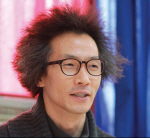Professor Lee Hwa-seok

When you think of the arts, what comes to your mind first? Maybe it is art or music, as we are somewhat unfamiliar with dance. There is a professor who is eager to overcome this situation, though. This is Lee Hwa-seok, a professor in the Department of Dance. He has studied dance for a long time. For this service, he received a distinction called “DANCE SPIRIT” from the Contemporary Dance Association of Korea (CODAKO).
How do you feel about receiving DANCE SPIRIT?
It seems that DANCE SPIRIT is given to people who have kept their dance spirit for a long time. I’m deeply moved to receive the award for the result of having danced for 40 years. While winning the award, I remembered the time when I started dance. I told my teacher that I wanted to dance and got slapped by him. At that time, dancing was viewed in a negative light and was very unfamiliar to the public. Moreover, most had stereotypes about dance: for example, that dancers weren’t smart. Sadly, it seems that there is still a prejudice against dancing. I will continue efforts to break down this prejudice.
What made you decide to start dancing?
Because of curiosity about something new, I decided to dance. In the past, the internet was not developed. Dance performances were also unusual. Therefore, I was unaccustomed to this kind of art. However, I came across a dance academy on my way home. Whenever I returned home from school by bus, the signboard of a dance academy attracted my attention and gave me a strong impression. I wondered what kind of place a dance academy was and what kind of world would be unfolded. I decided to enter the academy.
What do you remember most about your life?
Receiving DANCE SPIRIT lives in my memory, but the most memorable event is that of my two disciples received the top prize in a national competition. It was difficult to win first prize because there were many competitors and most of them had begun dance in elementary school. However, my disciples started dancing in high school. We tried to build the foundation and worked hard together. At first, it looked impossible to win, but in the end we did it!
What is your future plan? And please, say what you want to say.
I want to keep going with dancing until I’m 100 years old and live fully all day. I will break the bias and work with students as I have done before. Some people look at it negatively when I am on stage with the students because they think the students are inadequate to stand on stage with their professor. I want to show that students can also be on stage with their professors. Moreover, students who perform together improve through this experience. For example, a student said, “I want to be like my professor and study about dance for a long time.” In addition, most think that dancers aren’t good at studying. To overcome this prejudice, dancers need to study hard. There is another reason why dancers have to study hard. We can’t make choreography without philosophy and theory. Thus, I want to inform them that it is important to combine theory and practice. Dance has many attractions. In particular, dance is a method to express our thoughts by using body actions. Dance is more difficult for conveying messages than other methods, like language. Therefore, when dancers tell us their thoughts, they have to study how to send them easily. Through this process, messages become abundant. I hope people enjoy dance and know the attractions of dance.
Despite the preconceptions about dancing, he has walked on his own path and tried to overcome them. Starting with this new semester, why don’t we find fields that we are interested in, like him? We can be experts in our specific fields!

